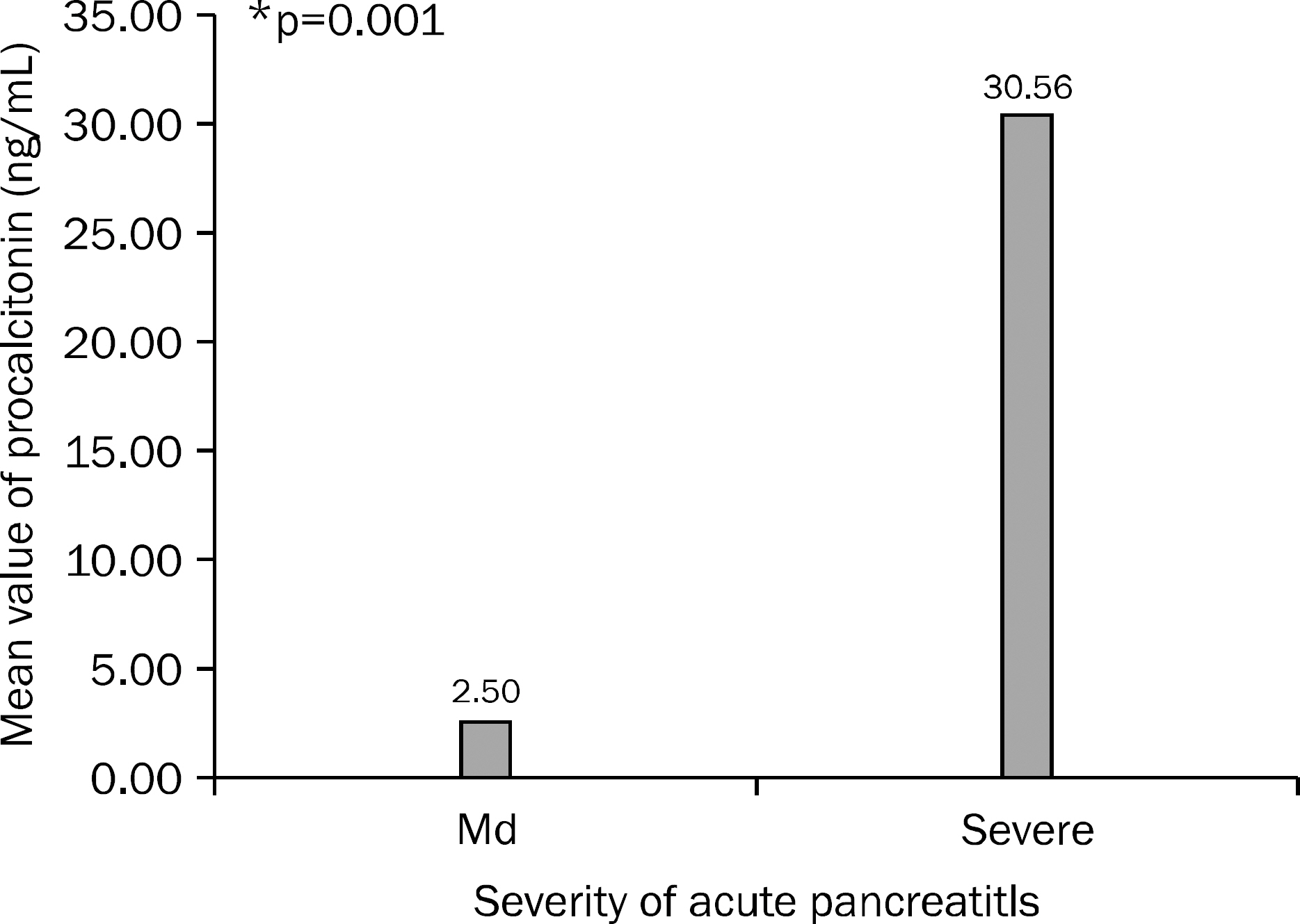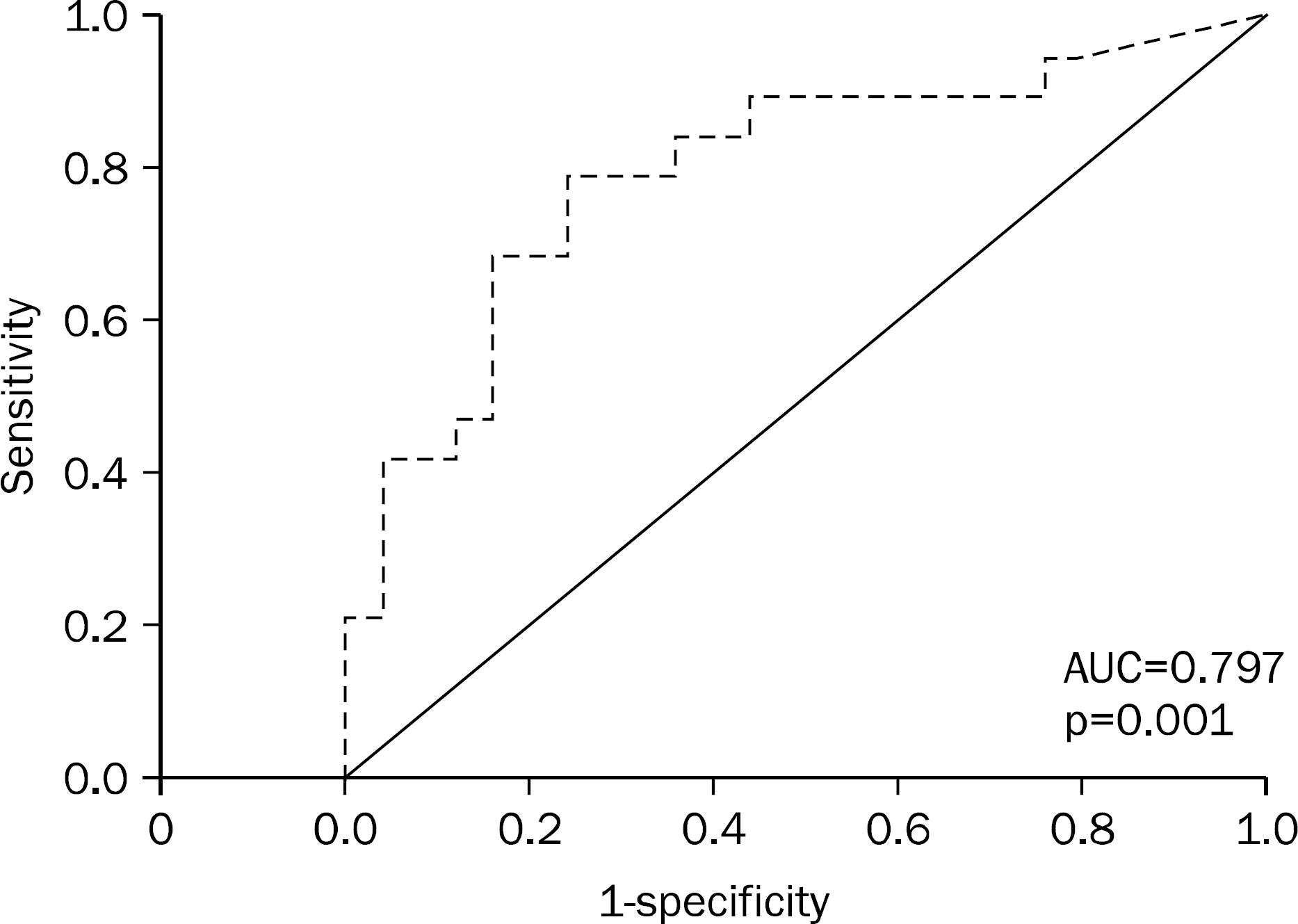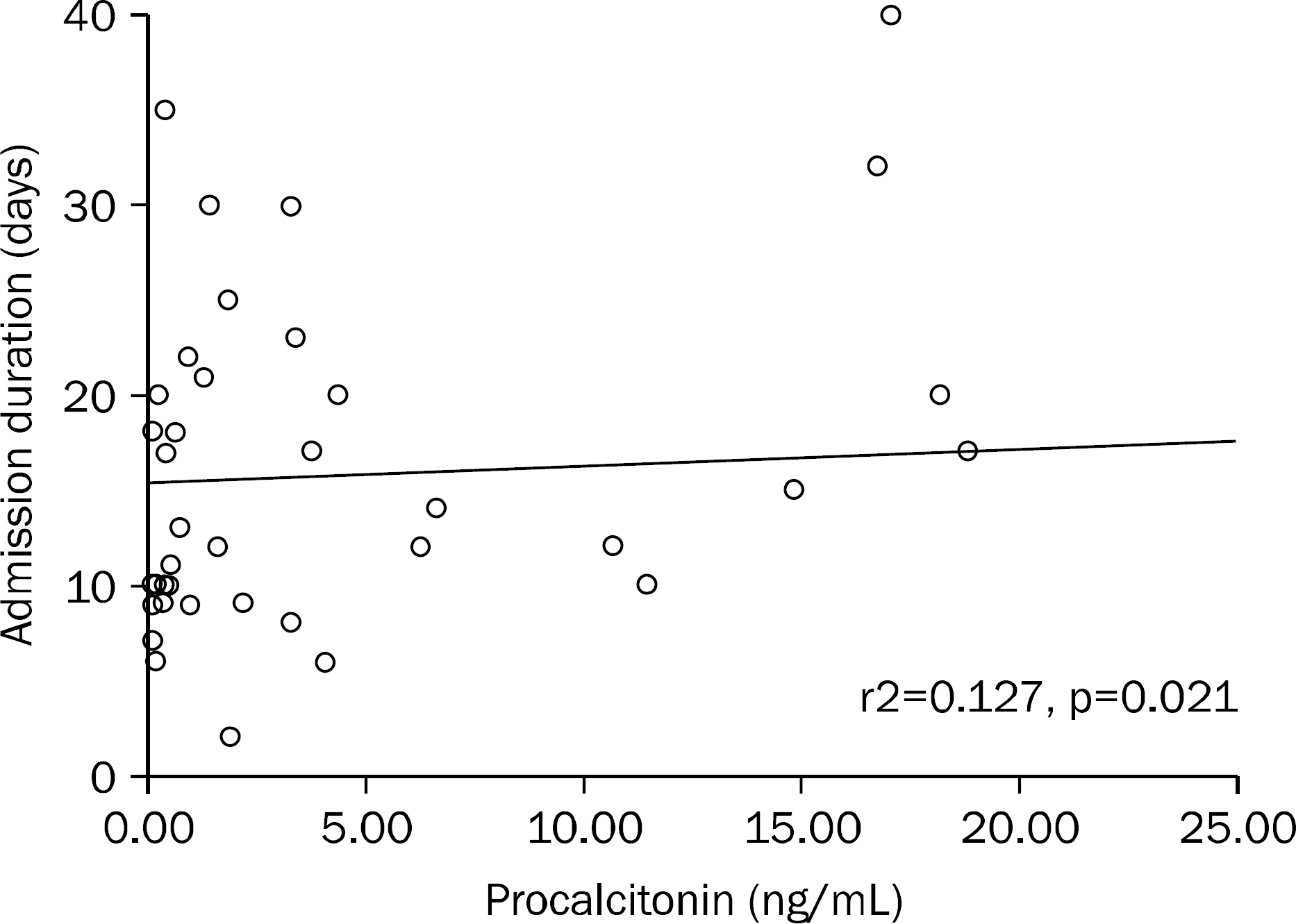Korean J Gastroenterol.
2011 Jul;58(1):31-37. 10.4166/kjg.2011.58.1.31.
Comparison of Serum Procalcitonin with Ranson, APACHE-II, Glasgow and Balthazar CT Severity Index Scores in Predicting Severity of Acute Pancreatitis
- Affiliations
-
- 1Department of Internal Medicine, Dong-A University College of Medicine, Busan, Korea. mhnho@dau.ac.kr
- 2Department of Radiology, Dong-A University College of Medicine, Busan, Korea.
- KMID: 1792812
- DOI: http://doi.org/10.4166/kjg.2011.58.1.31
Abstract
- BACKGROUND/AIMS
The aim of this study is to assess serum procalcitonin (PCT) for early prediction of severe acute pancreatitis compared with multiple scoring systems and biomarkers.
METHODS
Forty-four patients with acute pancreatitis confirmed by radiological evidences, laboratory assessments, and clinical manifestation were prospectively enrolled. All blood samples and image studies were obtained within 24 hours of admission.
RESULTS
Acute pancreatitis was graded as severe in 19 patients and mild in 25 patients according to the Atlanta criteria. Levels of serum PCT were significantly higher in severe acute pancreatitis (p=0.001). The accuracy of serum PCT as a predicting marker was 77.3%, which was similar to the acute physiology and chronic health examination (APACHE)-II score, worse than the Ranson score (93.2%) and better than the Balthazar CT index (65.9%). The most effective cut-off level of serum PCT was estimated at 1.77 ng/mL (AUC=0.797, 95% CI=0.658-0.935). In comparision to other simple biomarkers, serum PCT had more accurate value (77.3%) than C-reactive protein (68.2%), urea (75.0%) and lactic dehydrogenase (72.7%). Logistic regression analysis revealed that serum PCT has statistical significance in acute severe pancreatitis. Assessment of serum PCT levels and length of hospital stay by simple linear regression analysis revealed effective p-value with low R square level, which could make only possibilty for affection of serum PCT to admission duration (r2=0.127, p=0.021).
CONCLUSIONS
Serum PCT was a promising simple biomarker and had similar accuracy of APACHE-II scores as predicting severity of acute pancreatitis.
MeSH Terms
-
APACHE
Acute Disease
Adult
Aged
Aged, 80 and over
Area Under Curve
Biological Markers/blood
C-Reactive Protein/analysis
Calcitonin/*blood
Female
Humans
L-Lactate Dehydrogenase/blood
Length of Stay
Logistic Models
Male
Middle Aged
Pancreatitis/*diagnosis/pathology/radiography
Predictive Value of Tests
Protein Precursors/*blood
*Severity of Illness Index
Urea/blood
Figure
Reference
-
References
1. Triester SL, Kowdley KV. Prognostic factors in acute pancreatitis. J Clin Gastroenterol. 2002; 34:167–176.
Article2. Kusske AM, Rongione AJ, Reber HA. Cytokines and acute pancreatitis. Gastroenterology. 1996; 110:639–642.
Article3. Larvin M. Circulating mediators in acute pancreatitis as predictors of severity. Scand J Gastroenterol Suppl. 1996; 219:16–19.
Article4. Windsor AC, Kanwar S, Li AG, et al. Compared with parenteral nutrition, enteral feeding attenuates the acute phase response and improves disease severity in acute pancreatitis. Gut. 1998; 42:431–435.
Article5. Al-Nawas B, Krammer I, Shah PM. Procalcitonin in diagnosis of severe infections. Eur J Med Res. 1996; 1:331–333.6. Kylänpää-Bäck ML, Takala A, Kemppainen E, Puolakkainen P, Haapiainen R, Repo H. Procalcitonin strip test in the early detection of severe acute pancreatitis. Br J Surg. 2001; 88:222–227.
Article7. Lempinen M, Puolakkainen P, Kemppainen E. Clinical value of severity markers in acute pancreatitis. Scand J Surg. 2005; 94:118–123.
Article8. Gurda-Duda A, Kuś nierz-Cabala B, Nowak W, Naskalski JW, Kulig J. Assessment of the prognostic value of certain acute-phase proteins and procalcitonin in the prognosis of acute pancreatitis. Pancreas. 2008; 37:449–453.
Article9. Modrau IS, Floyd AK, Thorlacius-Ussing O. The clinical value of procalcitonin in early assessment of acute pancreatitis. Am J Gastroenterol. 2005; 100:1593–1597.
Article10. Bumbasirevic V, Radenkovic D, Jankovic Z, et al. Severe acute pancreatitis: overall and early versus late mortality in intensive care units. Pancreas. 2009; 38:122–125.11. Rau BM, Kemppainen EA, Gumbs AA, et al. Early assessment of pancreatic infections and overall prognosis in severe acute pancreatitis by procalcitonin (PCT): a prospective international multicenter study. Ann Surg. 2007; 245:745–754.12. Toouli J, Brooke-Smith M, Bassi C, et al. Guidelines for the management of acute pancreatitis. J Gastroenterol Hepatol. 2002; 17(Suppl):S15–S39.
Article13. Villatoro E, Bassi C, Larvin M. Antibiotic therapy for prophylaxis against infection of pancreatic necrosis in acute pancreatitis. Cochrane Database Syst Rev. 2006; 4:CD002941.
Article14. Servín-Torres E, Velázquez-García JA, Delgadillo-Teyer G, Galindo-Mendoza L, Bevia-Pérez F, Rivera-Bennet F. Severe acute pancreatitis: surgical management in a third-level hospital. Cir Cir. 2009; 77:407–410.15. Dervenis C, Bassi C. Evidence-based assessment of severity and management of acute pancreatitis. Br J Surg. 2000; 87:257–258.
Article16. Wyncoll DL. The management of severe acute necrotising pancreatitis: an evidence-based review of the literature. Intensive Care Med. 1999; 25:146–156.
Article17. Neoptolemos JP, Kemppainen EA, Mayer JM, et al. Early prediction of severity in acute pancreatitis by urinary trypsinogen ac-tivation peptide: a multicentre study. Lancet. 2000; 355:1955–1960.
Article18. Müller CA, Uhl W, Printzen G, et al. Role of procalcitonin and granulocyte colony stimulating factor in the early prediction of in-fected necrosis in severe acute pancreatitis. Gut. 2000; 46:233–238.19. Puolakkainen P, Valtonen V, Paananen A, Schröder T. C-reactive protein (CRP) and serum phospholipase A2 in the assessment of the severity of acute pancreatitis. Gut. 1987; 28:764–771.
Article20. Wilson C, Heads A, Shenkin A, Imrie CW. C-reactive protein, anti-proteases and complement factors as objective markers of severity in acute pancreatitis. Br J Surg. 1989; 76:177–181.
Article21. Chen CC, Wang SS, Lee FY, Chang FY, Lee SD. Proinflammatory cytokines in early assessment of the prognosis of acute pancreatitis. Am J Gastroenterol. 1999; 94:213–218.
Article22. Gendrel D, Bohuon C. Procalcitonin as a marker of bacterial infection. Pediatr Infect Dis J. 2000; 19:679–687.
Article23. Braithwaite S. Procalcitonin: new insights on regulation and origin. Crit Care Med. 2000; 28:586–588.
Article24. Mándi Y, Farkas G, Takács T, Boda K, Lonovics J. Diagnostic relevance of procalcitonin, IL-6, and sICAM-1 in the prediction of in-fected necrosis in acute pancreatitis. Int J Pancreatol. 2000; 28:41–49.
Article25. Riché FC, Cholley BP, Laisné MJ, et al. Inflammatory cytokines, C reactive protein, and procalcitonin as early predictors of necrosis infection in acute necrotizing pancreatitis. Surgery. 2003; 133:257–262.
Article26. Oláh A, Belágyi T, Issekutz A, Makay R, Zaborszky A. Value of procalcitonin quick test in the differentiation between sterile and in-fected forms of acute pancreatitis. Hepatogastroenterology. 2005; 52:243–245.27. Wanner GA, Keel M, Steckholzer U, Beier W, Stocker R, Ertel W. Relationship between procalcitonin plasma levels and severity of injury, sepsis, organ failure, and mortality in injured patients. Crit Care Med. 2000; 28:950–957.
Article28. Ammori BJ, Becker KL, Kite P, et al. Calcitonin precursors in the prediction of severity of acute pancreatitis on the day of admission. Br J Surg. 2003; 90:197–204.
Article29. Shafiq N, Malhotra S, Bhasin DK, Rana S, Siddhu S, Pandhi P. Estimating the diagnostic accuracy of procalcitonin as a marker of the severity of acute pancreatitis: a meta-analytic approach. JOP. 2005; 6:231–237.30. Melzi D'Eril GV, Merlini G, Finazzi S, Bosoni T, Barakat B, Pezzilli R. Procalcitonin is not a reliable marker for the assessment of severity in acute pancreatitis without infectious complications. Clin Chem. 2000; 46:428–430.
- Full Text Links
- Actions
-
Cited
- CITED
-
- Close
- Share
- Similar articles
-
- A comparison of the BISAP score and serum procalcitonin for predicting the severity of acute pancreatitis
- APACHE III Score as a Prognostic Parameter in Acute Pancreatitis
- Comparison of Multiple Scoring Systems and CT Severity Index for Systemic and Local Complications of Acute Pancreatitis
- Serum Lipase / Amylase Ratio in Assessment of Etiology and Severity of Acute Pancreatitis
- The Comparative Analysis between Ranson's Prognostic Sign and CT Grade in the Evaluation of the Severity of Acute Pancereatitis




